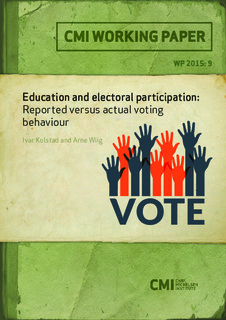| dc.contributor.author | Kolstad, Ivar | |
| dc.contributor.author | Wiig, Arne | |
| dc.date.accessioned | 2018-01-04T08:20:25Z | |
| dc.date.available | 2018-01-04T08:20:25Z | |
| dc.date.issued | 2015-08-01 | |
| dc.identifier | oai:www.cmi.no:5606 | |
| dc.identifier.citation | Bergen: Chr. Michelsen Institute (CMI Working Paper WP 2015:9) 12 p. | |
| dc.identifier.isbn | 82-8062-554-0 | |
| dc.identifier.issn | 0804-3639 | |
| dc.identifier.uri | http://hdl.handle.net/11250/2475105 | |
| dc.description.abstract | Using survey data of voters in Tanzania, this paper shows that while education does not affect self-reported voting in general elections, it increases actual voting. The less educated are more likely to claim to have voted without having done so, which may explain why previous studies of voting in developing countries fail to find an effect of education. We demonstrate the importance of this finding by using our survey data to generate predicted voting probabilities for the respondents to the 2012 Afrobarometer survey in Tanzania, and show that while mean self-reported voting does not differ much at different levels of education, the differences become significant when taking into account voting misrepresentation. | |
| dc.language.iso | eng | |
| dc.publisher | Chr. Michelsen Institute | |
| dc.relation | CMI Working Paper | |
| dc.relation | WP 2015:9 | |
| dc.relation.ispartof | CMI Working Paper | |
| dc.relation.ispartofseries | CMI Working Paper WP 2015:9 | |
| dc.relation.uri | https://www.cmi.no/publications/5606-education-and-electoral-participation | |
| dc.subject | Voting | |
| dc.subject | Elections | |
| dc.subject | Participation | |
| dc.subject | Education | |
| dc.subject | Tanzania | |
| dc.title | Education and electoral participation: Reported versus actual voting behaviour | |
| dc.type | Working paper | |
| dc.identifier.cristin | 1287069 | |
